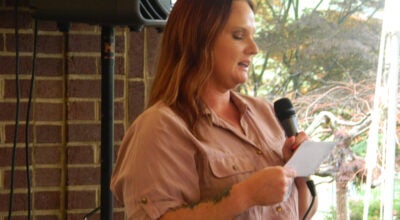Livingstone College begins recycling program
Published 12:00 am Tuesday, December 1, 2009
By Steve Huffman
shuffman@salisburypost.com
Lori Swaim, Rowan County’s recycling coordinator, told students at Livingstone College Wednesday the school’s recycling program can start immediately.
“I can have them here tomorrow,” Swaim said of the 64-gallon roll carts in which recyclables are collected. “We’ve got a fast turnaround.”
Swaim spoke to students to introduce them to the wonders of recycling. The topic of Swaim’s address was “Recycling 101,” and came during a weekly gathering of Livingstone students, faculty members and other school officials.
The event was held in Varick Auditorium.
Swaim said Livingstone’s leaders recently agreed to start the school in the county’s recycling program. She said the process is relatively easy.
“It’s pretty simple,” Swaim said. “We try to make it as easy as possible.”
She said when she took the job of recycling coordinator 10 years ago, there were few schools or businesses in the county that practiced recycling.
“Ten years ago, we might have had a couple of schools,” Swaim said.
Today, with the exception of one school, every public and private school in the county recycles. Swaim said about 100 Rowan County businesses also participate.
She welcomed Livingstone to the recycling fold.
“You’re only limited by what you want to do,” Swaim said.
She said bins will be placed across campus where everything from paper products to plastic bottles will be collected. Swaim said three types of paper ó white, mixed and newspaper ó are collected for recycling, though at the moment there’s only a market for white paper.
That owes, Swaim said, to the downturn in the economy. She said the only type of paper being sold these days is office paper.
But Swaim said recycling all paper continues to make sense even if the county isn’t at the moment getting paid for most.
Swaim said 50 percent of all landfill deposits are made up of paper. Keep the paper from going to the landfill, she said, and residents can double the life of the landfill.
Swaim said it’ll be up to Livingstone officials to decide where recycling bins are placed. Once the bins are full, they’ll be carried to those roll carts, which are emptied by workers manning the county’s recycling trucks.
“As far as your mind can go with it,” Swaim explained the extent of Livingstone’s foray into recycling.
It’ll also be up to school officials to decide exactly when recycling kicks off at Livingstone.
The college will benefit, Swaim said, because the amount spent on dumping fees will likely be cut in half.
Chad Mitchell, president of Livingstone’s Students in Free Enterprise, told his fellow students the typical American college generates 100 tons of recyclables per year.
He said of that amount, only 15 tons are recycled.
Mitchell challenged Livingstone’s students to do better.
“We all need to jump on board,” he said. “Let’s change our world.”




